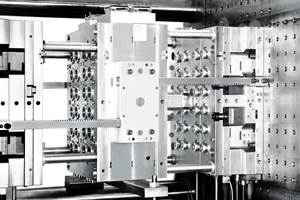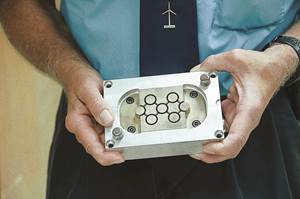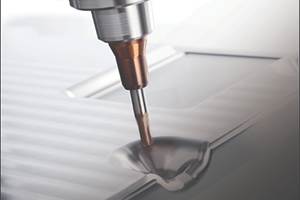Cutting to the Core of Medical Molds
Hard milling intricate steel geometry for critical medical devices cuts to the core of suppler relationships.
Hard milling intricate steel geometry for critical medical devices cuts to the core of suppler relationships. Rapid changes in technology involve a never-ending learning curve to increase value and reduce costs while advancing overall performance. To meet this challenge, get your suppliers involved as soon as possible!
The dramatic advancements in hard milling techniques, end mill geometry, cutters and coatings in many applications have been outperforming traditional approaches to EDM and the process of roughing in a soft state and then hardening to cut.
Precision mold builder and plastics specialists, Tech Molded Plastics, Inc. has developed a consultative supplier network that shaves the learning curve of the most challenging mold requirements with a team approach. Here is an example:
Parameters and Goals
The parameters are simple: production-ready mold with intricate coring was needed yesterday, within budget, and groomed to mold .0002 tolerances with .018 in diameter piloted shutoff. Timing for delivery is critical for product trials. Tech’s Tooling Operations Manager, Dale Pringle laid out the task with his team of veteran programmer-toolmakers, including Mike Crock. Crock quickly coordinated concept plans with Hitachi Distributor Harry Kraeling of Kraeling Industries and Hitachi cutting tool specialist Terry Kaikoh.
ech’s goal included hard milling H13 and 420 stainless with 30 percent faster productivity to achieve a near mirror release finish. This required testing cutting tool capabilities and precision planning. Crock reinforces the sense of urgency, “We had to make the most out of every minute possible.” Kraeling adds, “Working through the night, Mike, Terry and I needed to match the intricacy of the cavities, steel conditions and hardness to the wear life of a cutting tool, its coatings and geometry.”
Specialty cutting technologies were tested by navigating around a unique blending of standing towers deep in the core with intricate details for roughing and finishing. Advanced template language was also tested for a reduction in the manual inputs. The test results proved that harnessing supplier resources to analyze machining variables with specific details of the project produced far better results.
Finishing techniques were tested on S7 54 ~ 58 Rockwell (HRC) netting a 50 percent reduction in cut-time in key areas with limited tool wear conditions. Impressive finishing capability in hardened steel conditions was possible using specialized feeds/speeds matched to machine, metal and end mills. The total cost of manufacturing was significantly improved since actual cut-times were 30 percent less than projected for traditional cutting tools.
Summary
“Without a doubt, longer life and increased capabilities of the cutting tools equals greater productivity. The partnership that we have built with suppliers and distributors has helped our company work smarter,” says Crock. “We continue to produce amazing results in machining through a network of people that have a vested interest in our success.”
It’s no secret that technology can be purchased in every corner of the world. If you cut to the core of precision manufacturing, you will find that successful mold builders compete in the arena of idea sharing. A culture of innovation and talent is created when a company taps into its knowledge base of supply specialists.
Related Content
How to Lower Cycle Times With the Right Tool Steel
Combining excellent mechanical properties, high wear resistance and high thermal conductivity in a specialty tool steel yields cycle time reduction.
Read MoreHow to Select the Right Tool Steel for Mold Cavities
With cavity steel or alloy selection, there are many variables that can dictate the best option for moldmaking.
Read MoreReliable, Efficient 3D Printer for High-Quality Tool Steel Components
The updated TruPrint 2000 underscores Trumpf’s focus on the tool and die industry, including a larger, square build plate and various features to ensure high quality and mass production.
Read MoreMoldmakers Deserve a Total Production Solution
Stability, spindle speed and software are essential consideration for your moldmaking machine tool.
Read MoreRead Next
How to Use Continuing Education to Remain Competitive in Moldmaking
Continued training helps moldmakers make tooling decisions and properly use the latest cutting tool to efficiently machine high-quality molds.
Read MoreReasons to Use Fiber Lasers for Mold Cleaning
Fiber lasers offer a simplicity, speed, control and portability, minimizing mold cleaning risks.
Read MoreHow to Use Strategic Planning Tools, Data to Manage the Human Side of Business
Q&A with Marion Wells, MMT EAB member and founder of Human Asset Management.
Read More




















